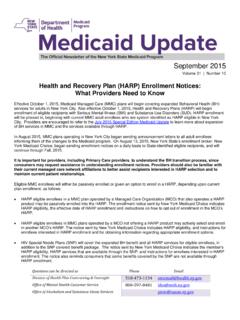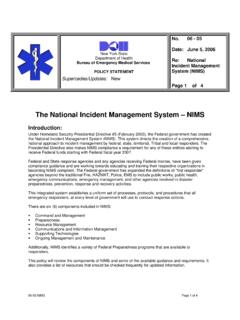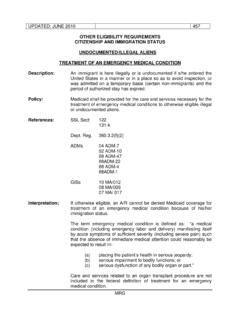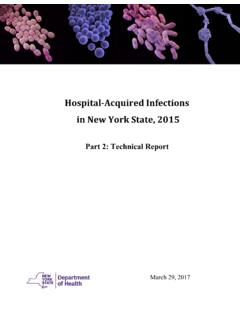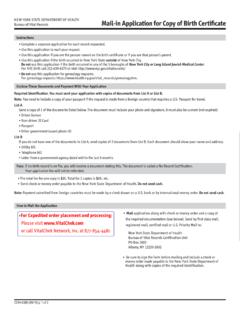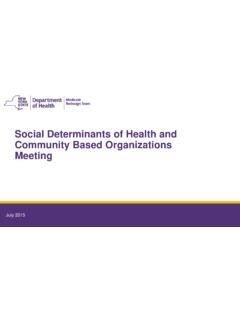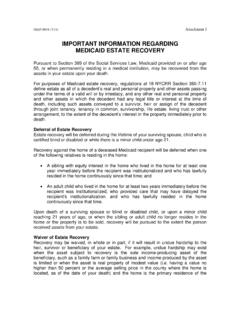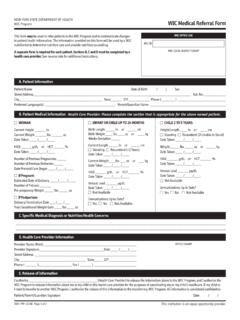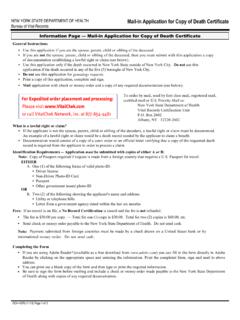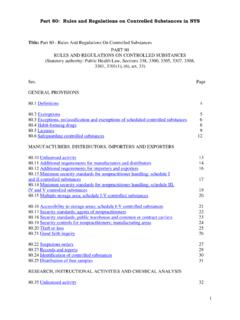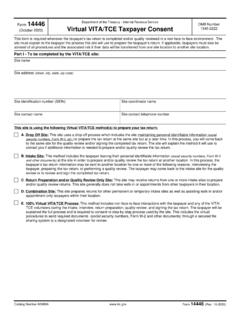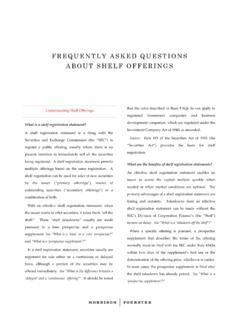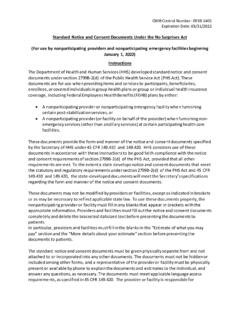Transcription of New York State Confidentiality Law and HIV: Public …
1 New york State Confidentiality Law and HIV: Public Health Law, Article 27-FWhat Is Public Health Law, Article 27-F?Article 27-F is the section of New york State Public Health Law thatprotects the confidentiality and privacy of anyone who has: Been tested for HIV; Been exposed to HIV; A diagnosis of living with HIV or HIV/AIDS-related illness; or Been treated for HIV/AIDS-related Health Law, Article 27-F: Requires that every individual age thirteen and older be offered an HIV test at least once as part of routine health care; Requires that, with some exceptions, information about a person s HIV status can only be disclosed (shared with others) if the person signs an HIV release form or if the form is signed by the person s legally appointed guardian or health care proxy; Applies to persons and facilities that directly provide health care services or social services and to anyone who receives HIV-related information about a person pursuant to a properly executed HIV release form; Requires that any person or facility whose work is covered by Article 27-F and who receives HIV-related information MUST keep that information confidential, as required by law.
2 What is confidential HIV-related information? This is any information that shows a person: Had an HIV-related test (such as an HIV antibody test, CD4 test, viral load test, PCR [polymerase chain reaction] test, or other test; Has a diagnosis of living with HIV, HIV-related illness, or AIDS; Has been exposed to HIV; Has one of these conditions, including information on the person s sexual contacts or needle-sharing contacts; or Is a partner or sexual/ substance use contact of a person diagnosed as living with what circumstances is a person offered anHIV test?HIV testing must be offered at least once to all patients age 13 orolder as part of routine health care services provided in thefollowing health care settings: Primary care services in diagnostic and treatment centers (including school-based clinics and family planning sites) Primary care services in outpatient departments of hospitals Inpatient departments of hospitals Emergency departmentsHIV testing must be offered by physicians, physician assistants,nurse practitioners or midwives who provide primary care, or theirrepresentatives, regardless of setting.)
3 Primary Care means the medical fields of: Family medicine General pediatrics Primary care Internal medicine Primary care obstetrics/gynecologyThere are three exceptions to the requirement to offer HIV testing: If the individual is being treated for a life-threatening emergency; If the individual has previously been offered or has previouslybeen tested for HIV (unless otherwise indicated due to more recent risk behavior); If the individual has been determined by the attending provider to lack mental capacity to consent required for an HIV test? New york State law requires that a person be informed prior to anHIV test being conducted, including being informed that they havethe right to decline an HIV test. Effective November 28, 2016,updates to Public health law remove the requirement for obtainingconsent for an HIV test in writing or orally, including elimination ofwritten consent for HIV testing in New york State correctionalfacilities, and removing references to consent forms.
4 The objectiveof the update to Public health law is to eliminate barriers to HIVtesting and make HIV testing comparable to the manner in whichother important laboratory tests are conducted. HIV testing remainsvoluntary and patients have the right to refuse an HIV test, butobtaining written or oral consent for testing is no longer required inany setting. Patients must be advised orally that an HIV test isgoing to be performed. If the patient objects to the HIV test, thisshould be noted in the patient s medical record. Can minors consent to their own HIV test, HIVtreatment and HIV prevention services?Yes. Minors have the ability to consent to an HIV test withoutparental involvement. They should be provided the requiredinformation about HIV and be told they have the right to decline anHIV test. Updates to Public health regulation in 2016 also now allowminors to consent to HIV treatment and HIV preventive services,including pre-exposure prophylaxis (PrEP) and post-exposureprophylaxis.
5 (PEP).4 What information must be given to a personbefore an HIV test is conducted? Prior to conducting diagnostic HIV testing, information about HIVmust be provided orally, in writing, through signage or in any otherpatient-friendly audio-visual format. Placing the NYS DOH HIVtesting clinic poster in a visible location or providing patients withthe NYS DOH patient brochure on HIV testing are simple ways ofconveying this information to patients. The testing poster andbrochure are available in seven different languages and can bothbe found here: is it necessary to have a signed releasedform in order to share information?Generally, HIV-related information can only be disclosed if theperson signs an approved HIV release form. For example, amedical provider may not share confidential HIV information from aperson s medical record with a case manager or other staff personfrom a community based organization without a signed releaseform.
6 To disclose HIV-related information from a medical record toa non-medical provider for any purpose, including linkage to care, aspecific signed release is required. The DOH Form 2557 Authorization for Release of Medical Information and ConfidentialHIV Related Information, is used for this purpose. This form allowsfor the release of both HIV-related information and non-HIV-relatedinformation. DOH Form 5032 titled Authorization for Release ofHealth Information (Including Alcohol/Drug Treatment and MentalHealth Information) and Confidential HIV/AIDS Related Informationis available for use when information to be released includesinformation about alcohol or substance use that is affordedadditional protected under federal regulation 42-CFR Part 2. 5In what situations may HIV-related information bedisclosed without an approved HIV release form?For medical treatment: Medical professionals working on the treatment team with the person s existing provider may discuss a patient s HIV-related information with each other or with their supervisors, but only to give necessary care; With a general release, a hospital or health care provider may share HIV-related information with a patient s insurance company if the information is needed to pay for medical care.
7 Medical personnel and certain other supervisory staff may have access to HIV-related information to provide or monitor services if the person is in jail or prison or is on monitor health care and disease prevention: Health care facility staff and committees, oversight review organizations, or government agencies that are authorized tohave access to medical records may be given HIV-related information when it is needed to supervise, monitor, or administer a health service or social service; Known partners of a person newly diagnosed with HIV must be notified by a physician or Public health officer that they have been exposed to HIV. Information about the source of infection will not be disclosed; Public health officials may have access to this information when required by law, such as HIV/AIDS case reporting to monitor disease trends and plan prevention programs; Researchers conducting research at an academic medical center with the approval of the medical center s Institutional Review Board, the board that is responsible for protecting human promote linkage and retention in HIV care:If a person appears to be out of care, information may be sharedbetween the Department of Health and a health care provider orcare coordinator with a documented care relationship with theindividual.
8 If a person with HIV appears to be out of care, he or shemay be contacted by the medical provider, care coordinator orhealth department staff to address barriers to entry into care and topromote engagement in circumstances for releasing HIV-related informationwithout an HIV-specific release form include: Authorized agencies that work with prospective adoptive or foster parents may have access to this information; A judge can issue a special court order that requires release of HIV-related information. The information cannot be released in response to a subpoena issued by an attorney; Article 27-F does not cover HIV testing when it is ordered solely for insurance reasons. This is covered by Insurance Law Section 2611. When an HIV test is given for insurance reasons, it generally includes a brief written consent and a referral to a counselor for further questions; Disclosure may occur without consent in certain cases of on-the-job exposure to HIV when all criteria for exposure have been met;7 When releasing HIV-specific information to anotherparty, is it necessary to include a statement that theinformation may not be re-disclosed without theprotected individual s consent ?
9 Generally speaking, a statement that information may not beredisclosed should accompany all cases where HIV-relatedinformation is shared. However, there are a number of exceptions. A re-disclosure statement is NOT required in the followingsituations: A health care provider or health facility shares the information when knowledge of the HIV-related information is necessary to provide appropriate care; Information is shared with third party reimbursers or their agents to the extent necessary to reimburse health care providers for health services; provided that, where necessary,an otherwise appropriate authorization for such disclosure has been secured by the provider; In instances of proper consent , which is defined as using the proper form. The proper form includes: specific authorized disclosure of HIV, name of protected individual, name of recipient, reason/ purpose, dated, time period of consent , signed; When clients themselves are disclosing HIV related information; Internal communications; When information is disclosed to parents/ legal guardians; For the purpose of contact notification; In the context of a court order; An authorized agency in conjunction with foster care/ adoption; Criminal justice agencies in order to carry out the departmentfunctions with respect to the protected individual; When disclosed to Public health officials; When conducing service delivery review/ monitoring.
10 When shared for the purpose of transplantation of example of a redisclosure statement is the following: This information has been disclosed to you from confidentialrecords which are protected by State law. State law prohibits youfrom making any further disclosure of the information without thespecific written consent of the person to whom it pertains, or asotherwise permitted by law. Any unauthorized further disclosure inviolation of State law may result in a fine or jail sentence or both. Ageneral authorization for the release of medical or otherinformation is NOT sufficient for further disclosure. - Public Health Law 2782 (5)(a)9 Resources:New york State Department of Health HIV Confidentiality Hotline800-962-5065 Monday - Friday, 8:30 - 4:30 can send a complaint report to:Special Investigation Unit AIDS InstituteNew york State Department of HealthEmpire State Plaza, Corning Tower #308 Albany, NY 12237518-473-2300To report a human rights violation anywhere in New york State :New york State Division of Human Rights, Office of AIDSD iscrimination Issues888-392-3644To access the form for alleged violations of Article 27-F, please see DOH form 2865, located here: For more information regarding federal privacy Department of Health and Human Services, Office for Civil Rights800-368-1019 For information and help with partner notification:Partner Services800-541-2437 Contact Notification Assistance Program (CNAP).
